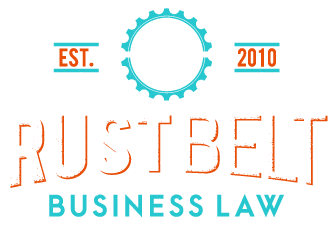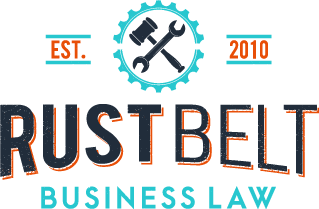Starting a Business in Pennsylvania: The Benefits of Legality
Legally starting a business in PA is one of the most important steps you will take as an entrepreneur. It gives you credibility as an owner, and it allows your potential customers and investors to take you seriously. Plus, forming your business will provide you with a layer of legal separation from your organization in the event of a liability issue or lawsuit, which can ultimately protect your personal assets.
PA Business Formation Lawyers
At Rust Belt Law, we help entrepreneurs take their ideas from concept to reality by providing the best business formation services in the area. From mom & pops and Kickstarters, to daring digital storefronts, our clients are businesses of all different sizes and industries.
Whether you have goals of hiring hundreds of employees or you're simply trying to get your doors open, having a business formation lawyer guide you through the business filing process will save you time, money, and stress in the long run, as well as give you guidance through the difficult decisions you will have to make while learning the legal side of how to start a business in PA.
Types of Business Entities in PA
![]()
C-Corporations
Both the shareholders and the company are taxed, creating double taxation, as well as personal separation.
![]()
Limited Liability Companies (LLC)
Simpler business structure than corporations with minimal requirements to maintain filing status.
![]()
S-Corporations
The corporation must have 100 or fewer shareholders and is taxed as a partnership for a single taxation situation.
![]()
General or Limited Partnerships
Two or more partners share all assets, profits, and financial and legal liabilities of a company.
![]()
Professional Companies
A registered or incorporated business that provides professional services and has multiple partners.
LLCs in Pennsylvania
LLCs are the most common type of business to form as they have the least amount of requirements and can be immensely flexible in their internal structure depending on the specific needs of your business. Once you, your partners (if you are not a Sole Proprietor), and your business lawyer decide on what type of organization your business will be filing as you can begin the process. If you plan on forming an LLC in Pennsylvania, you can expect the process to go roughly as follows:
LLC Filing Requirements
- Choosing a name for your Pennsylvania LLC business.
- Choosing a registered office for your new business.
- A registered office is the official mailing address for all legal mail and documents related to your business.
- Must be a street address in Pennsylvania.
- Filing a Pennsylvania LLC Certificate of Organization.
- This legal document officially establishes your business.
- Be prepared to provide your registered office and the services your LLC will provide when you and your lawyer reach this step in the process.
- Note: When starting a business in PA, there is a state filing fee associated with officiating this document.
- Creating a Pennsylvania LLC Operating Agreement.
- This will outline the operations and ownership of your newly founded business.

Questions you may have when starting a business in PA
What is an LLC (Limited Liability Company)? Why is it important to complete a legal business filing? What is the difference between a sole proprietorship and other types of business entities? Are corporations and LLCs the same thing? How long does it take to start a business in PA? What is the difference between an S-Corporation and a C-Corporation? What is an Operating Agreement? How do I know what business entity is best for my business?
Have a
Question?
Contact Us
today.



